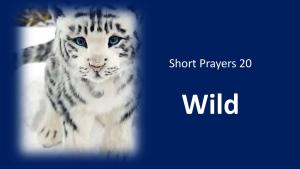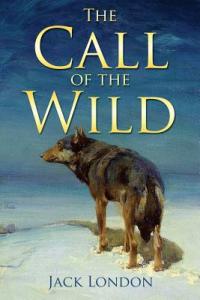 Short Prayers? What about our evolutionary inheritance? Deep down do our ancestral animal impulses lurk, just waiting to growl and attack? We know that our dogs are descendent from wolves. But, are we humans also descendent from wolves? Do we humans harken to the call of the wild?
Short Prayers? What about our evolutionary inheritance? Deep down do our ancestral animal impulses lurk, just waiting to growl and attack? We know that our dogs are descendent from wolves. But, are we humans also descendent from wolves? Do we humans harken to the call of the wild?
Might we think of our evolutionary inheritance as original sin?
Indeed, I was born guilty, a sinner when my mother conceived me. (Psalm 51:5)
The Call of the Wild
Buck came to live with us during the summer of 1988. It was a bad summer. It began with a terrible accident in which my eighteen year old son, Paul, broke his back jumping from a bridge into shallow water. He nearly lost his life through drowning. He nearly lost use of his body through paralysis. Yet, a team of surgeons performed successful reconstruction of the lower vertebrae and confined him to a summer in bed for recuperation. Moments of terror were followed by moments of hope and finally relief.
We awoke one morning to find a beautiful full grown Siberian husky asleep on our front porch. Where he had come from, we still do not know. Dog’s do not explain things in English. On a leash we led him throughout the neighborhood looking in vain for knowledge of the owner. After a few days the visitor welcomed himself into the interior of the house and began spending each night sleeping next to the bed of the confined invalid.
Paul and I agreed to name the newest member of the family “Buck”. No other name would do. Both of us had read Jack London‘s The Call of the Wild. I had gone on to read nearly a dozen of Jack London’s works. In this one, Buck is a San Francisco dog who is taken to Alaska where he turns into a wolf. Well, he doesn’t actually turn into a wolf. What he does is reach within himself and go back into his own evolutionary past to recapture the primitive force of nature, a force which London believed survives in all of us. Once Buck tasted the raw flesh of a weaker animal downed by the hunting pack, the primeval power of blood lust was unleashed with all its fury. Unbridled killing became ecstasy.
The Ecstasy of the Wild
There is an ecstasy that marks the summit of life, and beyond which life cannot rise. And such is the paradox of living. This ecstasy comes when one is most alive, and it comes as a complete forgetfulness that one is alive. This ecstasy, this forgetfulness of living, comes to the artist, caught up and out of himself in a sheet of flame; it comes to the soldier, war-mad on a stricken field and refusing quarter; and it came to Buck, leading the pack, sounding the old wolf-cry, straining after the food that was alive and that fled swiftly before him through the moonlight. He was sounding the deeps of his nature, and of the parts of his nature that were deeper than he, going back into the womb of Time.
 We would sit and look at our Buck. The soft blue eyes, the nuzzling nose, the peaceful repose. How could this magnificent and loving creature of flesh and fur—this member of our own family—exhibit any of the viciousness of the Buck described by Jack London?
We would sit and look at our Buck. The soft blue eyes, the nuzzling nose, the peaceful repose. How could this magnificent and loving creature of flesh and fur—this member of our own family—exhibit any of the viciousness of the Buck described by Jack London?
Then the day came when, with all of his might, our Buck charged the rabbit cage. He tore right through the chicken wire, grabbed the helpless bunny, and shook it wildly until its neck was broken. Another of our soft and lovable pets—another member of the family, so to speak—was now dead. It was a case of wanton murder. Buck was well fed and well cared for. He killed for…why? And Buck could not understand our sadness and our query. Shortly after the dastardly deed he returned to his normal pattern of household behavior with no evidence whatsoever that he might have a conscience.
Jack London was a naturalist, Marxist, and atheist. Yet, he was no materialist. In his many books he wrestled constantly with the relationship between body and soul, between our animal and our spiritual natures. Is it possible, London asked repeatedly, for the high morality of human culture to rise above our evolutionary past and finally shed our penchant for wanton killing? Must we so-called civilized beings live constantly with the threat that our loving relations may at any moment be interrupted by destructive violence? In our house, Buck is a daily reminder that these are questions well worth asking.
PRAYER
God of creation and promised redemption, help us to honor yet be realistic about our natures; and guard us from ourselves. Amen.
▓
Ted Peters is a Lutheran pastor and emeritus seminary professor. He is author of Short Prayers and The Cosmic Self. His one volume systematic theology is now in its 3rd edition, God—The World’s Future (Fortress 2015). He has undertaken a thorough examination of the sin-and-grace dialectic in two works, Sin: Radical Evil in Soul and Society (Eerdmans 1994) and Sin Boldly! (Fortress 2015). Watch for his forthcoming, The Voice of Public Christian Theology (ATF 2022). See his website: TedsTimelyTake.com.
▓













